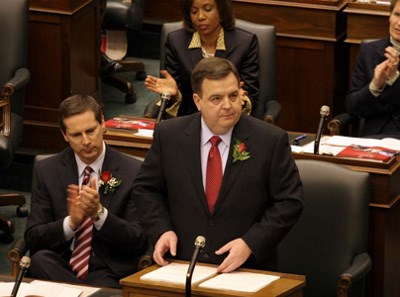UPDATED — March 31, 11:58 a.m.
The 2010 Ontario budget was revealed as a budget with the intent to help re-skill workers, provide jobs, help the north and bring the province out of the red, but not everyone is pleased with the document.
The budget speech was delivered by provincial finance minister Dwight Duncan in Queen's Park on March 25 at 4 p.m.
He paid special attention to the education, health and job situations across Ontario, as well as a focus on the situation in northern Ontario, which is suffering a worse recession due to the downturn in the forestry and minerals industries.
Duncan announced $32 billion for job creation programs, in order to continue to stimulate short-term job creation as well as re-training people who have lost their jobs in fields in which they are now unable to find work.
The biggest help for the north in the budget was the three-year Northern Industrial Electricity Rate Program, which would cut eligible industrial hydro costs by about 25 per cent per industry. This would help northern industries compete with the neighbouring provinces of Manitoba and Quebec, both with lower hydro rates.
A new and permanent Northern Ontario Energy Credit of up to $200 per year would be made available to help eligible families.
The budget also freezes compensation packages for MPPs and non-unionized provincial employees. The province is honouring wage increases written into collective agreements, however. Compensation means that not only are wages frozen, but insurance benefits will not be changing and pension plans remain the same.
For Nickel Belt MPP France Gélinas, the offerings in the budget are "just more of the same" from a provincial government "stuck in neutral."
"Northern Ontario's lost tens of thousands of jobs since the McGuinty Liberals were elected in 2003," Gélinas said. "Entire communities have been decimated. Families wonder how (they will) put food on the table and pay bills each month."
Gélinas said the parts of the budget meant to assist the north were mostly an insult.
"Now that 45,000 forestry jobs have been lost, the government finally delivers an industrial hydro rate...where was this kind of initiative in 2004 or 2006 or 2008 when jobs could have been saved?"
"The Northern Ontario Energy Credit is like a cruel joke," she claimed. She said with the new HST, it will cost northern Ontario families about $260 per year to heat their homes, more than the maximum granted by the credit — if people are qualify for the maximum allowed by the program.
The funding for education, which would create as many as 20,000 places for students at colleges and universities, is mostly for southern Ontario institutions, Gélinas said. With northern universities and colleges approaching maximum capacity, funding for more students is pointless as there would be no where to put them. Instead, the funding for college and university spaces caters to southern Ontario institutions, which have the room.
Not everyone was unhappy with the budget, though.
Greater Sudbury mayor John Rodriguez noted that in addition to the hydro credit plans for families and businesses, the budget calls for a $10 million increase in the Northern Ontario Heritage fund, bringing the total of the fund to $90 million.
The budget also allows for the government to help Huron Central Railway with its proposal to upgrade and develop infrastructure on the railway between Sault Ste. Marie and Greater Sudbury. Up to $15 million of the railway's $33 million plan would be supported. The upgrades to the railway would make it possible for more industrial and passenger use.
Rodriguez was also pleased the budget stepped in where “the federal government dropped the ball," by promising additional funds for child care, something he said he believes is important to "the working families of Greater Sudbury."
Both Rodriguez and Bartolucci said they believed the budget's focus on northern Ontario would help stimulate jobs as well as keep people working in the north, instead of moving to southern Ontario or Alberta, where there are more jobs.
Bartolucci called the 2010 budget is the “friendliest northern Ontario budget to date.”
With $1.2 billion promised for infrastructure upgrades to water, wastewater, roads, and more, the budget is there to help build northern Ontario, he said.
“The budget acknowledges the impact of the global recession on Sudbury," he noted. "We continue to stay the course so that we can achieve our goals as defined by the people of northern Ontario."
